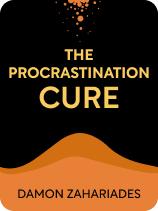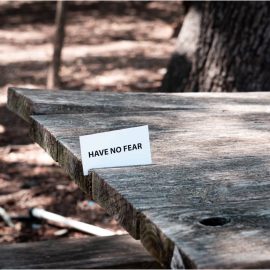

This article is an excerpt from the Shortform book guide to "The Procrastination Cure" by Damon Zahariades. Shortform has the world's best summaries and analyses of books you should be reading.
Like this article? Sign up for a free trial here.
What is The Procrastination Cure by Damon Zahariades about? What are the main takeaways of the book?
The Procrastination Cure delves into the causes of chronic procrastination and how it negatively affects your life. Zahariades gives helpful tips to address each cause by removing distractions, increasing motivation, and managing your time.
Read below for a brief overview of The Procrastination Cure.
The Procrastination Cure by Damon Zahariades
The Procrastination Cure by Damon Zahariades is a practical handbook for understanding why you procrastinate and how to break the habit. A self-professed chronic procrastinator, Zahariades shares the strategies that helped him change his behavior, with the promise that you can apply the same techniques to manage your procrastination and enjoy a less stressful, more productive life.
Zahariades left a corporate job to create his own business focused on helping people be more productive. He’s written other books on the topic, including The Mental Toughness Handbook and The Art of Saying No. He also posts on his website, Art of Productivity, on a variety of topics related to productivity, including time management, habit formation, and goal setting.
Zahariades prioritizes concrete tips you can implement right away, which he presents as a list of 21 tactics you can adopt one at a time until you’ve incorporated all of them into your life. For this guide, we’ll integrate these tips throughout our overview.
Procrastination Is Delay That Hurts You
Zahariades defines procrastination as delaying action on something that’s in your best interest to do now. He notes that this is more specific than just putting one task off in order to do something else, which can be a strategic choice. He emphasizes that everyone procrastinates—time is limited, and it’s human nature to choose an activity that will bring immediate rewards over one that will bring future satisfaction. Your goal, then, is not to get rid of this tendency, but to gain control over it so that it doesn’t cause problems in your life.
Some people, including Zahariades, believe procrastination is sometimes helpful. They distinguish between passive procrastination, where you delay the important task and instead do something with immediate rewards, and active procrastination, where you delay the important task but choose to do other necessary tasks that are slightly less important but still on your to-do list.
While critics argue that active procrastination is a failure of self-regulation, Zahariades believes it might work well for some people, such as those who thrive under pressure. But he recommends that anyone with a chronic procrastination problem first focus on getting that under control before experimenting with active procrastination.
The High Price of Procrastination
As Zahariades points out, you can’t do everything, so every time you do something, it comes at the expense of something else you didn’t do. Procrastination can have immediate consequences when you miss opportunities that require you to act quickly. It can also have longer-term effects that compound when you procrastinate in many areas of your life. For instance, imagine you put off going to the dentist for so long that now you need an emergency root canal, which you try to put on a credit card—except it’s maxed out because you haven’t paid the bill in a while.
Zahariades says he used to be a chronic procrastinator, delaying important things despite negative consequences in all areas of his life. His car was towed repeatedly because he never got around to renewing the registration—other times, he had the new registration sticker sitting on his desk but never put it on his license plate. When Zahariades overcame his tendency to procrastinate, he says he experienced greater success, as well as a sense of purpose and satisfaction.
Determine What Drives You to Procrastinate
Zahariades recommends getting to the bottom of why you procrastinate, and under what circumstances, as that knowledge can inform which strategies will help you most. While procrastination is usually a way of coping with underlying thoughts, emotions, and impulses, the particulars will be different for each person. He lays out the most common patterns, which we’ll summarize below.
Identify your personal procrastination triggers by monitoring yourself over a period of a couple weeks. Every time you feel the urge to procrastinate, stop to assess your thoughts and feelings to see what might be behind that urge. Use the tendencies you notice to focus your efforts on the root causes of your procrastination habit.
The Fundamental Issue: You’re Wired to Seek Immediate Rewards
Zahariades identifies several reasons for procrastination rooted in the fact that your brain instinctively prefers immediate rewards to delayed gratification. By the same token, immediate negative consequences are a compelling deterrent, but delayed consequences aren’t. Put another way, procrastination is a conflict between the opposing interests of Present You and Future You. This explains why you may procrastinate when a task doesn’t energize you or when it seems like nothing bad will happen if you don’t do it. The more difficult and complex a task, the greater the reward your brain needs to perceive in pursuing it.
Next, we’ll discuss Zahariades’s recommendations if issues of motivation or reward cause of your procrastination.
Make Distractions More Difficult
Zahariades recommends eliminating as many distractions from your environment as possible and making them harder to access. As he explains, this works because procrastination starts with the urge to put off an important task first, and then you look around for something to do instead. The goal is to minimize the options available for where to put your time and attention so that your only choice is to refocus on the task you need to do. Meanwhile, if you increase the amount of time and effort required to start doing distracting activities, even just a little, it will be easier to ride out the urge.
Zahariades offers these suggestions for minimizing distraction:
- From your computer: Use a website blocker to prevent you from going to the sites where you tend to waste time, delete bookmarks, or even turn off your internet temporarily.
- From your phone: Delete tempting apps, or better yet, keep your phone in a drawer when you need to focus.
- From your TV: Hide your remote somewhere hard to retrieve, like at the back of a closet.
Make Focusing More Satisfying
Zahariades also offers several ways to set up reward systems to motivate you when the work doesn’t offer immediate rewards:
- Reward yourself when you overcome the urge to procrastinate and start a task.
- Earn rewards when you get things done. For example, you might win points for completing tasks and ultimately redeem those points for a prize.
- Turn a boring task into a game (gamification). There are apps that do this for you, or you can make up your own system, like timing yourself and trying to beat your record.
- Use “temptation bundling.” Match each task on your to-do list with an activity that you enjoy doing, which you can only do when you finish the required task.
Increase Consequences and Accountability
Zahariades has several suggestions for how to make the negative consequences of procrastination more of a deterrent. They all involve creating systems that will make sure you feel the effects of your choices right away, often by recruiting other people to hold you accountable. Here are some ideas:
- Think about the eventual outcomes of procrastinating (such as feeling overwhelmed and stressed, scrambling to meet deadlines, or missing them entirely), so it will be harder to justify doing it.
- Tell an accountability partner when you plan to complete a task and ask them to follow up with you about it.
- Use a “commitment device” that limits other options or creates an immediate consequence to raise the stakes of not doing the task. For example, ask a friend to post an embarrassing video of you online if you don’t meet your deadline, or have your partner hide your car keys so you won’t be able to leave the house until you finish your work.
Build the Habit of Doing the Work
Zahariades suggests that instead of waiting to feel motivated, you should practice taking action regardless of how you feel until it becomes a habit. On a daily basis, the first task you do should be the one you dread the most. For larger goals, focus on the process rather than the product: If you establish a consistent routine for how and when you’ll work on the task, eventually your effort will produce the result you want.
Going Deeper: Examine the Thoughts and Feelings Behind Your Procrastination
We’ve explored some ways procrastination can result from the human brain’s search for rewards, but Zahariades considers other possible sources of the problem as well. He presents several models of how a task that stirs up strong emotions or triggers negative thoughts can lead you to procrastinate.
Overcome the Fears That Hold You Back
Zahariades suggests that the emotional culprit behind most procrastination is fear. This fear can take many forms, he explains:
- Fear of failure: When a task involves something you don’t have much experience doing, you don’t believe you’re good at, or that reminds you of a past experience that went badly
- Fear of success: When you’re not sure you can live up to high expectations, you feel you haven’t earned your success, or you’re nervous about what might come after success (like a bigger workload or more intense scrutiny)
- Perfectionism, or fear of imperfection: When the risk of a less-than-perfect outcome is so unbearable that you avoid the task altogether
To help you overcome these challenges, Zahariades suggests shifting your perspective, or applying logic to expose your anxiety as irrational:
- Reframe failure as useful information that your approach isn’t working, which gives you a chance to make adjustments.
- Be specific about your fears, and evaluate how realistic they are.
- Recognize that the difference between a perfect outcome and an almost perfect one is negligible.
- Reflect on how perfectionism stresses you out and prevents you from taking action. Then ask yourself why you need things to be perfect.
Remove Your Brain’s Barriers to Action
Zahariades says negative self-talk—when your internal voice is critical or full of worry—can trigger procrastination by undermining your self-confidence, making you reluctant to act. You can combat negative self-talk by disputing it and replacing it with a more realistic perspective.
Getting Started: Understand What Stops You From Taking the First Step
The next group of issues that might be driving your procrastination relates specifically to initiating work on a task or project. Zahariades points out a few reasons why starting is the hardest part for many people. For one thing, if it’s a major undertaking, you may feel overwhelmed by the task at hand—and feeling overwhelmed for any reason makes it difficult to take action. You may also delay starting because you’re uncertain about what to do first or because you’re inclined to keep researching and considering options to avoid making a choice. Indecisiveness, Zahariades cautions, can be a symptom of some of the other causes of procrastination already mentioned, like aversion to risk, fear of failure, or perfectionism.
If taking the first step is where you’re stuck, consider the following advice:
- Make an exception to the “do the hardest thing first” rule, and instead start with the easiest thing and build momentum.
- If unrelated personal or professional issues are causing the overwhelm, tackle those situations directly.
- If you’re not sure how to approach the task, consider the possible outcomes of each option to show yourself none of them ends in disaster. The cost of staying stuck in deliberation is usually greater than the cost of making an imperfect choice.
- Commit to working on a task for just ten minutes. Once you get started, momentum will make it easier to continue.
- Break down bigger tasks into smaller steps, and treat each step as its own to-do item. This helps you avoid feeling overwhelmed and lets you see your progress as you go.
Back to Basics: Tools for Keeping Track of To-Dos
Throughout the book, the author mentions a few tools that he implies you should include in your system for managing your time and tasks. Here, we’ve collected Zahariades’s tips and tricks for using lists and schedules to support your success.
The Lists You Need to Succeed
There are at least three lists Zahariades suggests you maintain. First, make a list of your short-, medium-, and long-term goals. Next, create a master to-do list of all your commitments. Use this to create your daily to-do list, which includes only the things you’re planning to do today. (Zahariades also mentions having additional, context-specific to-do lists, but he doesn’t go into detail about how these fit into the rest of the system.) The final organizational component is a calendar where you can keep track of appointments and plan out your day. Next, we’ll take a closer look at how to use these tools.
Get Clear on Your Goals and Priorities
To prevent your to-do lists from becoming cluttered or outdated as priorities change, Zahariades recommends you revisit them regularly with the following tips in mind:
- Review your master to-do list every week, alongside your goals list, and remove or re-prioritize items as appropriate so your list never gets cluttered.
- Assign every item on your to-do list a priority level. Use your goals list to evaluate which tasks are most important to your goals and which are urgent.
- Limit your daily to-do list to seven items or fewer so that you can actually accomplish everything on the list. Review the list each morning and remove any non-essential tasks.
Scheduling and Time Management
Zahariades recommends several practices that increase your awareness of and control over how you spend your time and tackle your to-do list:
- Decide ahead of time how you’ll schedule your day, including what tasks you’ll work on when, so that you only take free time as planned.
- Set a time limit for every task on your to-do list. Then shorten the time, recognizing that work will expand to fill the time you allow for it.
- Split up long blocks of time into manageable chunks with breaks in between each one. Use a timer to keep track. Group similar tasks together.
- Track your energy levels at different times of day to understand when you usually feel most energetic, and schedule your most challenging tasks for those times.
- Stop multitasking. Doing more than one thing at once doesn’t make you more productive, but it gives you a false sense that you’re getting a lot done.

———End of Preview———
Like what you just read? Read the rest of the world's best book summary and analysis of Damon Zahariades's "The Procrastination Cure" at Shortform.
Here's what you'll find in our full The Procrastination Cure summary:
- Advice from a former chronic procrastinator on how to stop procrastinating
- How to get to the bottom of what drives you to procrastinate
- How to use lists and schedules to manage your time and tasks






